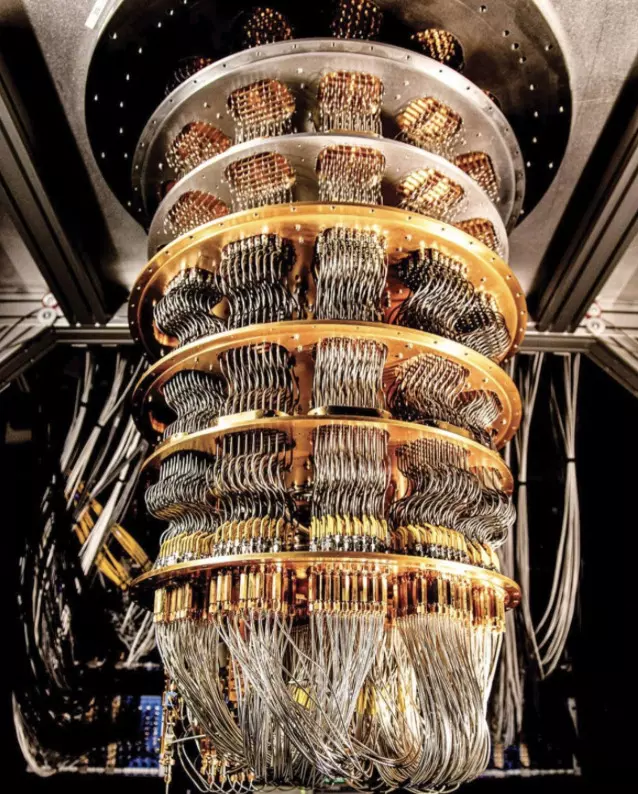IBM, Google, Intel: The Quantum Computing race is heating up! Top 5 quantum computing stocks
IBM, Google, Intel: The Quantum Computing race is heating up! Top 5 quantum computing stocks

Quantum computing is on the brink of transforming the technological landscape, promising to solve complex problems and perform calculations at speeds far beyond the reach of today’s classical computers. By harnessing the power of quantum mechanics—superposition, entanglement, and quantum interference—these computers will process information in radically new ways, offering capabilities that traditional systems can only dream of.
How Quantum Computers Work
Quantum computers operate on the principle of quantum states, which allow qubits to exist in multiple states simultaneously—both 1 and 0 at once. This ability to perform parallel computations allows quantum computers to solve problems much faster than classical systems. Unlike classical bits, which are constrained to represent either a 0 or a 1, qubits harness the strange phenomena of quantum mechanics, enabling them to perform calculations on a scale that defies conventional computing limitations.
The Challenge of Building Quantum Machines
Creating a functional quantum computer is a monumental engineering challenge. It requires precision and a deep understanding of quantum mechanics. Engineers are experimenting with various qubit technologies to build scalable quantum systems. These include trapped-ion qubits, superconducting qubits, and even more exotic options like topological qubits, each of which offers its own set of advantages and challenges in terms of stability, coherence time, and error rates.
The Birth of Quantum Computing
The idea of quantum computing was first proposed by physicist Richard Feynman in 1982, who envisioned a new type of machine capable of simulating quantum systems. Traditional computers, based on binary bits, struggle with such simulations due to the exponentially complex nature of quantum systems. Feynman’s insight was groundbreaking: quantum computers could leverage quantum bits (qubits) that can simultaneously represent both 1 and 0, dramatically enhancing computational power.
Advantages of Quantum Computing
Parallel Processing: Quantum computers can process vast amounts of data simultaneously by exploiting the quantum state of qubits. This allows them to tackle problems that would be infeasible for classical computers.
Exponential Power: The computational power of quantum systems grows exponentially as more qubits are added, unlike classical computers, where power increases linearly with more transistors.
Breakthrough Applications: Quantum computers are expected to revolutionize fields that require immense computational power, such as cryptography, drug discovery, climate modeling, and optimization problems.
Challenges and the Road Ahead
While quantum computing holds immense promise, the road to practical, large-scale quantum systems is filled with challenges. Quantum computers are highly sensitive to noise and environmental disturbances, making error correction and system stability significant hurdles. Furthermore, classical computers will likely continue to dominate for many everyday tasks, with quantum systems focusing on niche areas requiring extraordinary computational abilities.
The Quantum Computing Frontier
Quantum computers operate based on the principles of quantum theory, which governs the behavior of energy and matter at the atomic and subatomic levels. These systems utilize subatomic particles—such as electrons, photons, or ions—to perform calculations that would otherwise take millennia for a classical computer.
Leading the Quantum Revolution
As the race to dominate quantum computing intensifies, a mix of tech giants and agile startups are pushing the boundaries of what’s possible. Here’s a look at some of the trailblazers in the quantum computing space:
IBM: A pioneer in superconducting qubit technology, IBM's quantum processor Condor boasts 1,121 qubits. Their roadmap aims for a 100,000-qubit system by 2033, with modular quantum computing systems like the Quantum System Two leading the way.
Intel: Known for its semiconductor expertise, Intel is exploring silicon-based spin qubits. Their Tunnel Falls chip, which has 12 qubits, represents a step toward building more stable and scalable quantum processors.
Google Quantum AI: Achieved a landmark in quantum computing with their Sycamore processor, which demonstrated quantum supremacy. Google is now focusing on quantum algorithms for machine learning and aims to create a million-qubit quantum computer.
Microsoft Azure Quantum: Offering a full-stack quantum computing platform, Microsoft combines quantum hardware and software tools like Q# to provide developers with a complete quantum computing ecosystem.
Amazon Web Services (AWS): Through its Braket service, AWS offers access to a variety of quantum hardware platforms, enabling users to experiment with hybrid quantum-classical computing.
Quantinuum: Born from the merger of Honeywell Quantum Solutions and Cambridge Quantum Computing, Quantinuum is a leader in hardware-agnostic quantum solutions, offering the TKET software for quantum programming.
Rigetti Computing: Known for using superconducting circuits, Rigetti focuses on integrating quantum and classical systems, particularly for applications in machine learning and chemistry.
IonQ: Specializing in trapped-ion qubits, IonQ’s quantum systems offer long coherence times and precision, making them ideal for quantum chemistry simulations and financial modeling.
Xanadu: Utilizing photonic quantum computing, Xanadu leverages light-based qubits to overcome temperature and scalability limitations, with its PennyLane software enabling quantum machine learning research.
D-Wave Systems: A pioneer in quantum annealing, D-Wave specializes in optimization problems, offering a quantum computing system that has already been used by companies like Google and NASA.
The Quantum Horizon
The competition to master quantum computing is well underway, with both established tech companies and innovative startups working relentlessly to push the limits of what's possible. Although we are still a long way from having quantum computers that can outperform classical systems in all areas, the potential for revolutionizing industries like drug discovery, logistics, finance, and cybersecurity is enormous. As research continues and breakthroughs emerge, the future of computing is undeniably quantum.
Quantum Computing Stocks
Alphabet Inc. (GOOG, GOOGL)
YTD Return: 33.0%
Forward Dividend Yield: 0.43%
Honeywell International Inc. (HON)
YTD Return: 11.3%
Forward Dividend Yield: 1.97%
Microsoft Corp. (MSFT)
YTD Return: 18.7%
Forward Dividend Yield: 0.75%
FormFactor Inc. (FORM)
YTD Return: 0.7%
Forward Dividend Yield: N/A
IonQ Inc. (IONQ)
YTD Return: 166.1%
Forward Dividend Yield: N/A
International Business Machines Corp. (IBM)
YTD Return: 45.8%
Forward Dividend Yield: 2.90%
Nvidia Corp. (NVDA)
YTD Return: 172.8%
Forward Dividend Yield: 0.03%
Rigetti Computing Inc. (RGTI)
YTD Return: 559.0%

